In this article:
Rice is a staple food for many people. Out of the 7 days of the week, they may consume rice for at least 2–3 days. It tastes good and goes with almost every cuisine, from Chinese to Indian.
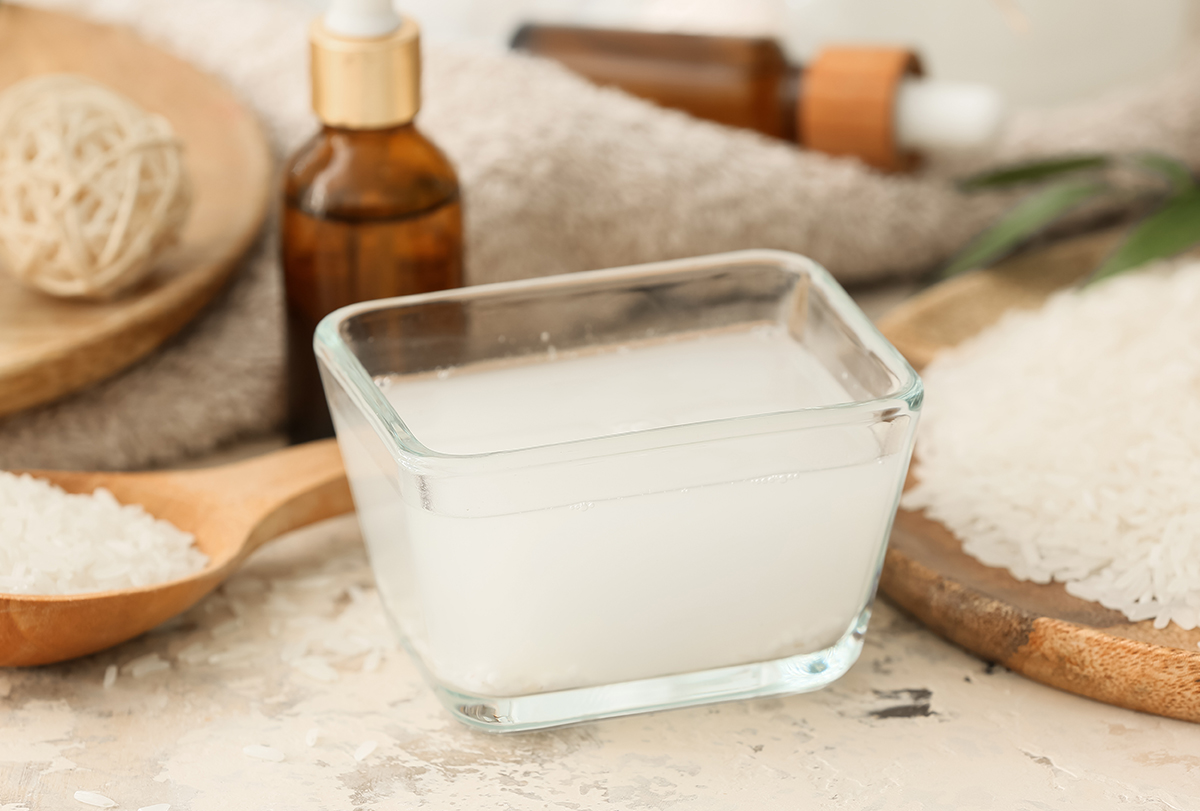
Rice is prepared by washing, straining, and then boiling or steaming the rice grains. But did you know that you can use the rice water left behind after straining the rice grains to give your hair a boost of good health? You will get not only a delicious bowl of rice but also a perfect hair mask ingredient!
Rice water is packed with hair care benefits. It has great antioxidant properties, which is why it can help protect your hair from sun damage. (1)(2) It is also a hair growth-promoting agent.
When you use rice water on your hair topically, you give your hair a chance to have improved elasticity and decreased hair friction, all of which contribute to hair health. (3)(4)
The good news is you can increase the positive effects of rice water on your hair by mixing it with other ingredients.
Ways to Use Rice Water for Hair Growth
Here are some ingredients to add to rice water to boost hair growth.
1. Fenugreek seeds and rice water
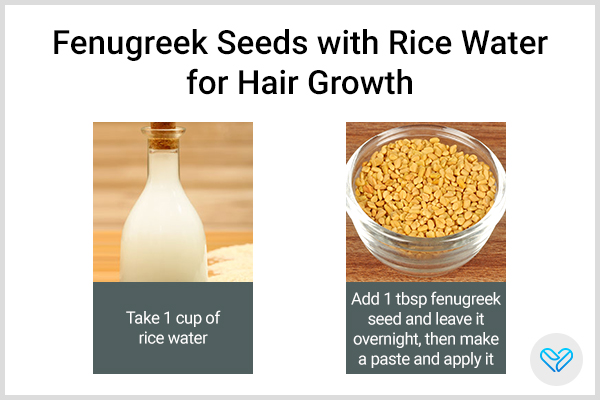
Experts who specialize in traditional medicine sing high praises for methi seeds, also known as fenugreek seeds.
Fenugreek is a therapeutic plant that grows very commonly in Asia. This plant is an anti-inflammatory agent that has a high antioxidant content, which helps treat scalp infections, thereby safeguarding hair from harm. (5)
Moreover, researchers have found that the high nicotinic acid levels in fenugreek seeds provide notable relief from dandruff problems. (6)(7)
So, fenugreek seeds with rice water are a must-have combination for those who believe in the power of hair care.
How to use it:
- Soak 1 tbsp of fenugreek seeds in 1 cup of rice water overnight.
- Blend the mixture into a paste, and apply it to your scalp.
- Leave it on for 40-45 minutes.
- Rinse it off with water and mild shampoo.
2. Green tea and rice water
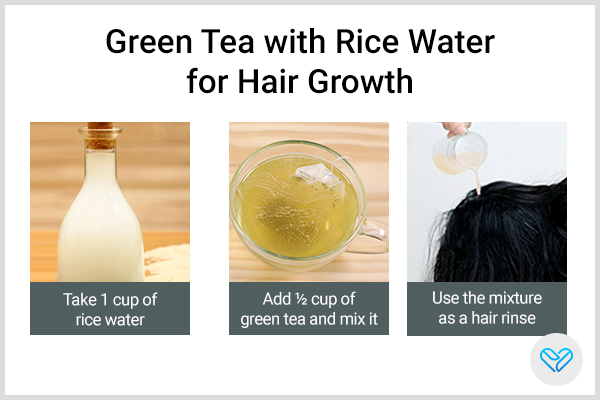
The multiple advertisements on green tea and its effects on health must have already given you an idea of the high therapeutic value of green tea.
This tea is filled with antioxidants that are a must for people who wish to enhance their hair health.
It is also rich in compounds called catechins, which are known to ensure the proper balance of hormones in the body. As hormonal imbalance can cause hair loss, green tea is good for promoting hair health and hair regrowth. (8)
How to use it:
- Mix ½ cup of green tea with 1 cup of rice water.
- Use the mixture as a final rinse after shampooing.
3. Black seed oil and rice water
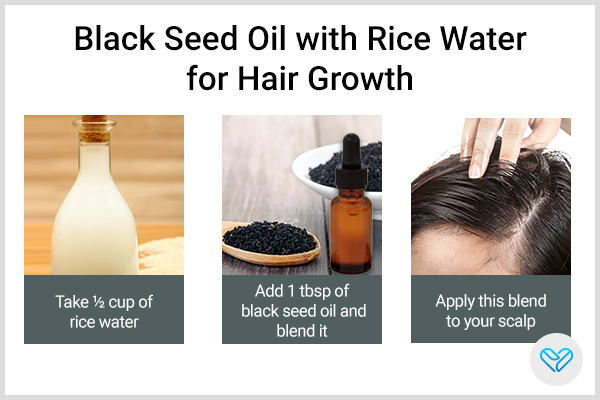
Black seed oil, or kalonji oil, is extracted from the plant called N. sativa, which is widely grown in Asia and Africa. The oil is abundant in fatty acids and other hair-nourishing compounds, which make it a great fit for your hair care regimen. (9)
Black seed oil can treat many scalp diseases such as eczema and psoriasis upon topical use. This effect has been demonstrated by various research studies. (10)(11)(12)
Black seed oil is also known to promote hair growth when applied directly to the scalp. (13)
According to a study, black seed oil has the power to decrease hair loss, and with regular use over 90 days, you may experience as little as 0% of hair loss. (14)
How to use it:
- Mix 1 tbsp of black seed oil with ½ cup of rice water.
- Apply this blend to your scalp, giving it a gentle massage.
- Leave it on for an hour, and then rinse it off using your regular shampoo.
4. Ginseng and rice water
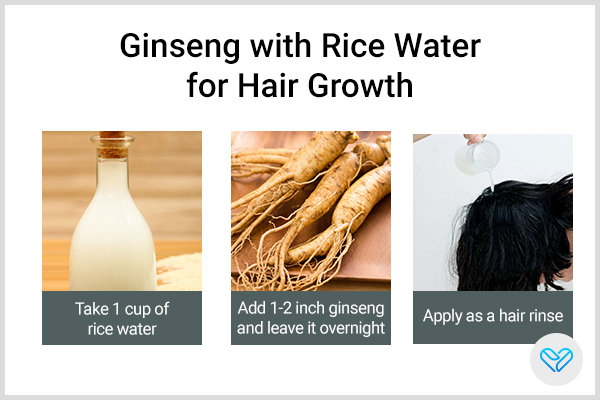
Ginseng is one of the most widely used and accepted medicinal herbs in the Chinese medicine system as this herb has the potential to fight hundreds of ailments.
It is rich in so many biological compounds that make it great for numerous issues including poor hair health. One such compound is ginsenoside, which, according to experts, promotes hair growth and hair health. (15)
How to use it:
- Infuse 1-2-inch of ginseng in 1 cup of rice water.
- Use it as a hair rinse to stimulate the hair follicles.
5. Curry leaves and rice water
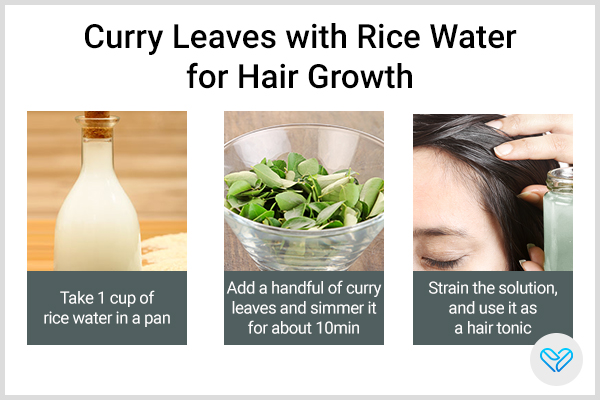
The use of curry leaves in cosmeceutics and dermatology runs way back in time. These leaves have been used as a hair tonic after boiling them in water. They can promote the growth of hair and also keep natural hair color intact. (16)
Curry leaves are also rich in antioxidants, because of which they can reduce oxidative stress in the body, which is one of the biggest culprits of hair loss. (16)
How to use it:
- Put a handful of curry leaves and 1 cup of rice water in a pan.
- Simmer it for about 10 minutes, and let it cool.
- Strain the solution, and use it as a hair tonic.
6. Ginkgo biloba and rice water
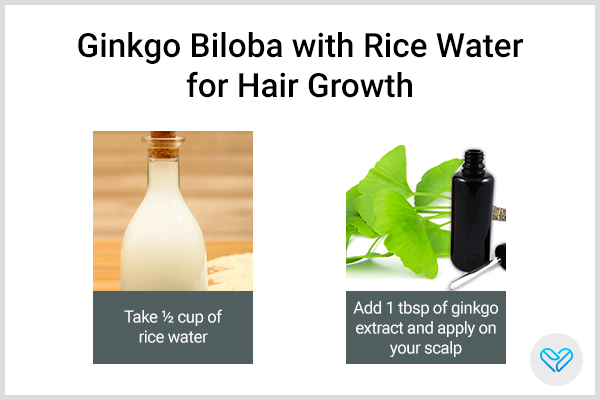
Many hair specialists advocate for the use of ginkgo as a hair tonic because of its ability to increase blood flow to the scalp, thus keeping the hair healthy and encouraging it to grow.
Ginkgo has a rich nutritional profile, which explains its positive hair care effects. (17)
How to use it:
- Mix 1 tbsp of ginkgo extract with ½ cup of rice water.
- Apply the mixture to your scalp.
- Leave it on for 20 minutes before washing it off.
7. Sage and rice water
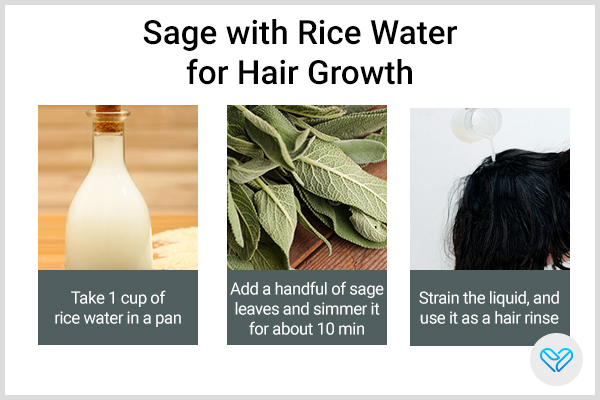
Sage is a well-known plant and is often used as a garnish in the kitchen. It is a very potent antiseptic agent with a powerful cleansing activity. It is capable of making your hair feel a lot stronger and thicker than before. (18)
How to use it:
- Put a handful of sage leaves and 1 cup of rice water in a pan.
- Simmer it for about 10 minutes, and let it cool.
- Strain the liquid, and use it as a hair rinse.
8. Amla and rice water
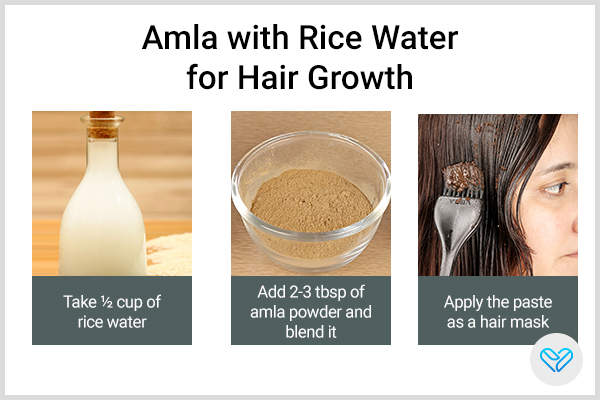
Amla, or Indian gooseberry (E. officinalis), has the ability to stimulate healthy hair growth by causing proliferation of the hair follicles.
It is such an amazing ingredient that experts advise everyone to drink amla juice or use it topically on the scalp for the wholesome development of hair. (19)
How to use it:
- Blend 2-3 tbsp of amla powder and ½ cup of rice water into a paste.
- Use it as a hair mask.
- Leave it on for 30-40 minutes, and then rinse it off with water.
Most-Asked Questions
Can rice water promote hair growth?
Yes, rice water can improve hair growth due to its nutrient content.
How often should I use rice water for hair growth?
Using rice water once or twice a week is usually enough to achieve evident results.
Can I store rice water for later use?
Yes, you can store rice water in the refrigerator for up to a week.
Do I need to dilute rice water before using it?
It’s advisable to dilute rice water with plain water to prevent overconcentration.
Can rice water cause hair damage?
When used properly, rice water is unlikely to result in hair damage and is normally very safe.
Final Word
The effects of rice water, which is rich in antioxidants and hair growth properties, can be enhanced when it is used with other natural ingredients such as fenugreek seeds, green tea, black seed oil, and ginseng. These ingredients promote healthier hair naturally.
- Was this article helpful?
- YES, THANKS!NOT REALLY


